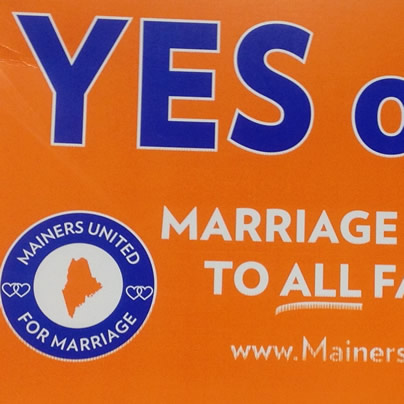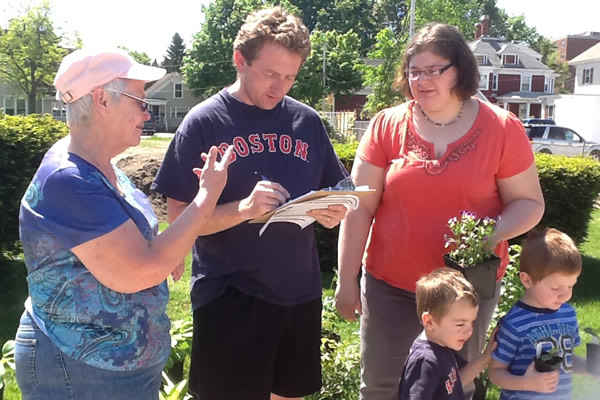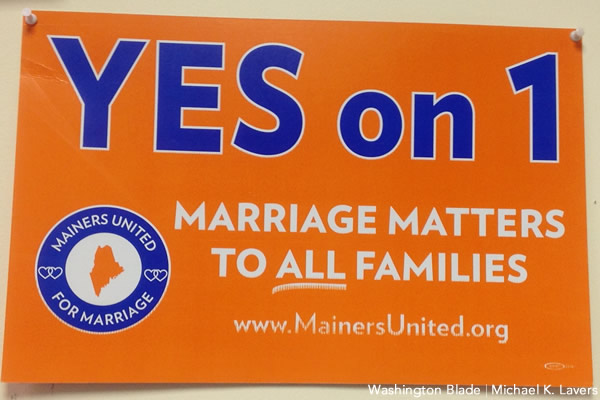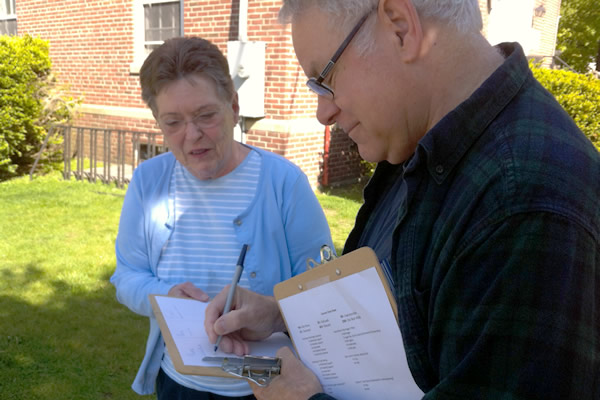National
Maine marriage campaign optimistic going into referendum
Polls indicate majority of voters would support ballot measure to allow same-sex marriage.


A Mainers United for Marriage volunteer speaks with likely voters in Sanford (Photo courtesy of Mainers United for Marriage)
SCARBOROUGH, Maine – Portland resident Ellen Ward never thought she would find herself speaking with fellow voters in support of marriage rights for same-sex couples.
The self-described introvert changed her mind, however, in 2009 when she listened to gays and lesbians and others testify in support of a same-sex marriage bill during a legislative hearing in Augusta, the state capital.
“They were leading very what most people call normal lives and just wanted to be able to affirm their love and commitment in the same way that other people got too,” Ward told the Washington Blade as she canvassed a suburban Portland neighborhood in the rain on Thursday afternoon. “And I was just really impressed with people standing up and testifying about that and churches testifying about that.”
Nearly three years after Maine voters repealed the state’s same-sex marriage law that then-Gov. John Baldacci signed, supporters of nuptials for gays and lesbians remain confident that a ballot question that would allow them to tie the knot will pass.
“What’s so unique about Maine is because we’re the first state to ever go on the offensive and bring the issue directly to the voters; we’ve been able to dictate our own timeline,” Matt McTighe, campaign manager of Mainers United for Marriage, the group supporting Question 1, told the Blade during an interview at his Portland office on Friday. “There was never a ticking clock. Every time this has come up before when it’s defensive it’s always in the current — something happens, a precipitating action, a court case, a legislative victory whatever. Our opponents then do something to undermine that or write something into the constitution or whatever. And now we’re on their turf. Now we’re playing defense on their side of the field.”
Voters in 2009 repealed the same-sex marriage law by a 53-47 percent margin. McTighe, a former Human Rights Campaign staffer who has worked on marriage efforts in Massachusetts and in other New England states for MassEquality and the Boston-based Gay and Lesbian Advocates and Defenders, described the 2012 campaign in Maine as a “night and day kind of difference” from that run ahead of the 2009 referendum.
“It’s always been designed from the ground up as a campaign for voters,” he said. “We didn’t have to worry about the legislature. We weren’t thinking about a court case or anything like that. Right from the beginning we’ve tried to figure out who are the voters we need to be talking to, let’s employ some of the most sophisticated modeling and tactics that have ever been applied to the marriage movement, let’s bring in the best people, the best consultants, the best field organizers, the best team and put together a plan and a model to figure out who we need to talk to.”
Voter: Same-sex marriage “doesn’t really affect me”
Maine is one of four states with either a same-sex marriage referendum or a constitutional amendment that would define marriage as between a man and a woman on the ballot next month. The Maine Freedom to Marry Coalition in January submitted more than 105,000 signatures to the Secretary of State in order to bring the issue before voters.

Polls indicate a majority of Maine voters would support a ballot measure to allow same-sex marriage. (Photo by Michael K. Lavers)
A Portland Press Herald poll conducted between Sept. 12-16 shows Question 1 leads by a 57-36 percent margin. A Public Policy Polling survey late last month indicates 52 percent of likely voters support the ballot measure, compared to 44 percent who oppose it and four percent who remain undecided.
Several Scarborough residents with whom Ward spoke said they would support Question 1.
“I’ll probably vote for it,” said one teenager who turns 18 on Nov. 1. He told Ward that he also works with a lesbian. “It doesn’t really affect me. I’m not really 100 percent for it, but I have nothing against it. Not to put it the wrong way but I really don’t care. Do whatever you want. If anything it’ll be better for the economy.”
A woman who lives on a nearby cul-de-sac told Ward that she plans to vote against the ballot question.
“I personally don’t have a problem with you getting together, but I’m not in favor of calling it marriage,” she said. “It’s a sacrament. To redefine marriage, I would vote no.”
Ward conceded the woman’s position against marriage rights for same-sex couples was “discouraging.” She did acknowledge, however, that she feels that her support of basic rights for gays and lesbians was encouraging.
“People have come a long way on that issue, certainly than even 20 years ago,” said Ward, who recalled a telephone conversation she had a couple of months ago with a 90-year-old woman who marched against racial segregation in the 1960s. She initially said she opposed nuptials for gays and lesbians, but Ward said she suddenly changed her mind when she realized the parallels between the civil rights and same-sex marriage movements. “I just feel there are so many people that we talk to these days who are completely supportive.”
Marriage remains “personal” for voters
Six Mainers United for Marriage ads continue to air on local television stations. These include one that features four generations of a family from the Downeast town of Machias and another that spotlights firefighters who support nuptials for gays and lesbians. Protect Marriage Maine, the group opposing Question 1, debuted their first two television ads on Monday.
“You have to make this about the voter themselves. You need to give them a personal reason to connect with the gay people that they know in their lives, to think about this issue in a way that they haven’t thought of before,” said McTighe, who is also a firefighter in the southern coastal Maine town of York. He applauded President Obama for supporting marriage rights for same-sex couples, but stressed the issue remains what he described as a deeply personal one for each potential voter. “You don’t just change your mind because somebody else did. You have to change your mind because somebody made it personal to you. Somebody showed you what is at stake. And also gave you an opportunity to have your questions and concerns addressed. That’s why the grassroots approach has been so unique, to be able to go out and have door-to-door with everyone in our persuadable universe, those people we identified early on.”
Mainers United for Marriage reported to the state Commission on Ethics and Election Practices late on Friday that it has raised slightly more than $3.35 million so far this year, compared with the $429,794.32 that Protect Marriage Maine has pulled in. McTighe told the Blade that he would like to raise another $750,000 to $1 million “to keep pace with” the amount of airtime that the National Organization for Marriage has reserved on the state’s television stations in the weeks leading up to Election Day.
“Now is sort of the crunch time,” he said. “We’ve been prepping for his. We’ve been planning for this so now we feel like we’re prepared for everything. When they come out with one attack, we’ve got plan A. When they come out with a different attack, we’ve got plan B. We can pull it as needed. We can execute as we need to, as long as we have the resources.”
McTighe said another challenge that the campaign faces of potential complacency.
“Because we are doing really well in the polls and because people are seeing all this great stuff and people love our TV ads and all this other stuff and we’re getting all this great earned media, it’s almost too easy for people to say, well they don’t need my help. They don’t me to volunteer. They don’t need me to donate. They don’t need me to write a check. They’ve got 57 percent in the polls. Well I don’t care as much now,” he said. “But the fact is we’ve never won before. Whether that 57 percent is solid or soft or who knows, we’ll see, but we’ve never won. Until we win, we should just assume that our opponents will dump whatever resources they need. We should just assume that they will stop at nothing. And we should assume that no lead is safe until we can actually win and hold one for just once, at least once. Then we can start saying okay well is a point where you’re safe. We’re just not there yet. We’re not there in any of the states.”
In spite of these potential hurdles, McTighe remains optimistic that Mainers United for Marriage will be able to successfully respond to Question 1 opponents’ ads and statements against nuptials for gays and lesbians during the final weeks of the campaign.
“We feel extremely well positioned to deal with anything they throw our way because we’ve had two and a half years to prepare for everything,” he said. “That is what’s so unique about Maine.”
Ward agreed.
“People have had a lot more chance to think about this,” she said, noting the passage of same-sex marriage laws in New York and other states since the 2009 vote. “It’s very much on people’s minds and people are talking about it now. It’s not so unheard of. I think people are just kind of more getting used to the idea and saying, oh, I have people in my family that this [impacts] or I have neighbors and I think they’re very nice people and wow, you know they want to get married. A lot of people had never thought of that before. I think part of it is people are getting used to the idea. And people who are already on board are saying of course, of course this matters. And more and more they want to see this happen. It just seems a no brainer to them.”

The Comings & Goings column is about sharing the professional successes of our community. We want to recognize those landing new jobs, new clients for their business, joining boards of organizations and other achievements. Please share your successes with us at [email protected].
Congratulations to Gil Pontes III on his recent appointment to the Financial Advisory Board for the City of Wilton Manors, Fla. Upon being appointed he said, “I’m honored to join the Financial Advisory Board for the City of Wilton Manors at such an important moment for our community. In my role as Executive Director of the NextGen Chamber of Commerce, I spend much of my time focused on economic growth, fiscal sustainability, and the long-term competitiveness of emerging business leaders. I look forward to bringing that perspective to Wilton Manors — helping ensure responsible stewardship of public resources while supporting a vibrant, inclusive local economy.”
Pontes is a nonprofit executive with years of development, operations, budget, management, and strategic planning experience in 501(c)(3), 501(c)(4), and political organizations. Pontes is currently executive director of NextGen, Chamber of Commerce. NextGen Chamber’s mission is to “empower emerging business leaders by generating insights, encouraging engagement, and nurturing leadership development to shape the future economy.” Prior to that he served as managing director of The Nora Project, and director of development also at The Nora Project. He has held a number of other positions including Major Gifts Officer, Thundermist Health Center, and has worked in both real estate and banking including as Business Solutions Adviser, Ironwood Financial. For three years he was a Selectman, Town of Berkley, Mass. In that role, he managed HR and general governance for town government. There were 200+ staff and 6,500 constituents. He balanced a $20,000,000 budget annually, established an Economic Development Committee, and hired the first town administrator.
Pontes earned his bachelor’s degree in political science from the University of Massachusetts, Dartmouth.
Kansas
ACLU sues Kansas over law invalidating trans residents’ IDs
A new Kansas bill requires transgender residents to have their driver’s licenses reflect their sex assigned at birth, invalidating current licenses.

Transgender people across Kansas received letters in the mail on Wednesday demanding the immediate surrender of their driver’s licenses following passage of one of the harshest transgender bathroom bans in the nation. Now the American Civil Liberties Union is filing a lawsuit to block the ban and protect transgender residents from what advocates describe as “sweeping” and “punitive” consequences.
Independent journalist Erin Reed broke the story Wednesday after lawmakers approved House Substitute for Senate Bill 244. In her reporting, Reed included a photo of the letter sent to transgender Kansans, requiring them to obtain a driver’s license that reflects their sex assigned at birth rather than the gender with which they identify.
According to the reporting, transgender Kansans must surrender their driver’s licenses and that their current credentials — regardless of expiration date — will be considered invalid upon the law’s publication. The move effectively nullifies previously issued identification documents, creating immediate uncertainty for those impacted.
House Substitute for Senate Bill 244 also stipulates that any transgender person caught driving without a valid license could face a class B misdemeanor, punishable by up to six months in jail and a $1,000 fine. That potential penalty adds a criminal dimension to what began as an administrative action. It also compounds the legal risks for transgender Kansans, as the state already requires county jails to house inmates according to sex assigned at birth — a policy that advocates say can place transgender detainees at heightened risk.
Beyond identification issues, SB 244 not only bans transgender people from using restrooms that match their gender identity in government buildings — including libraries, courthouses, state parks, hospitals, and interstate rest stops — with the possibility for criminal penalties, but also allows for what critics have described as a “bathroom bounty hunter” provision. The measure permits anyone who encounters a transgender person in a restroom — including potentially in private businesses — to sue them for large sums of money, dramatically expanding the scope of enforcement beyond government authorities.
The lawsuit challenging SB 244 was filed today in the District Court of Douglas County on behalf of anonymous plaintiffs Daniel Doe and Matthew Moe by the American Civil Liberties Union, the ACLU of Kansas, and Ballard Spahr LLP. The complaint argues that SB 244 violates the Kansas Constitution’s protections for personal autonomy, privacy, equality under the law, due process, and freedom of speech.
Additionally, the American Civil Liberties Union filed a temporary restraining order on behalf of the anonymous plaintiffs, arguing that the order — followed by a temporary injunction — is necessary to prevent the “irreparable harm” that would result from SB 244.
State Rep. Abi Boatman, a Wichita Democrat and the only transgender member of the Kansas Legislature, told the Kansas City Star on Wednesday that “persecution is the point.”
“This legislation is a direct attack on the dignity and humanity of transgender Kansans,” said Monica Bennett, legal director of the ACLU of Kansas. “It undermines our state’s strong constitutional protections against government overreach and persecution.”
“SB 244 is a cruel and craven threat to public safety all in the name of fostering fear, division, and paranoia,” said Harper Seldin, senior staff attorney for the ACLU’s LGBTQ & HIV Rights Project. “The invalidation of state-issued IDs threatens to out transgender people against their will every time they apply for a job, rent an apartment, or interact with police. Taken as a whole, SB 244 is a transparent attempt to deny transgender people autonomy over their own identities and push them out of public life altogether.”
“SB 244 presents a state-sanctioned attack on transgender people aimed at silencing, dehumanizing, and alienating Kansans whose gender identity does not conform to the state legislature’s preferences,” said Heather St. Clair, a Ballard Spahr litigator working on the case. “Ballard Spahr is committed to standing with the ACLU and the plaintiffs in fighting on behalf of transgender Kansans for a remedy against the injustices presented by SB 244, and is dedicated to protecting the constitutional rights jeopardized by this new law.”
National
After layoffs at Advocate, parent company acquires ‘Them’ from Conde Nast
Top editorial staff let go last week

Former staff members at the Advocate and Out magazines revealed that parent company Equalpride laid off a number of employees late last week.
Those let go included Advocate editor-in-chief Alex Cooper, Pride.com editor-in-chief Rachel Shatto, brand partnerships manager Erin Manley, community editor Marie-Adélina de la Ferriére, and Out magazine staff writers Moises Mendez and Bernardo Sim, according to a report in Hollywood Reporter.
Cooper, who joined the company in 2021, posted to social media that, “Few people have had the privilege of leading this legendary LGBTQ+ news outlet, and I’m deeply honored to have been one of them. To my team: thank you for the last four years. You’ve been the best. For those also affected today, please let me know how I can support you.”
The Advocate’s PR firm when reached by the Blade said it no longer represents the company. Emails to the Advocate went unanswered.
Equalpride on Friday announced it acquired “Them,” a digital LGBTQ outlet founded in 2017 by Conde Nast.
“Equalpride exists to elevate, celebrate and protect LGBTQ+ storytelling at scale,” Equalpride CEO Mark Berryhill said according to Hollywood Reporter. “By combining the strengths of our brands with this respected digital platform, we’re creating a unified ecosystem that delivers even more impact for our audiences, advertisers, and community partners.”
It’s not clear if “Them” staff would take over editorial responsibilities for the Advocate and Out.



















